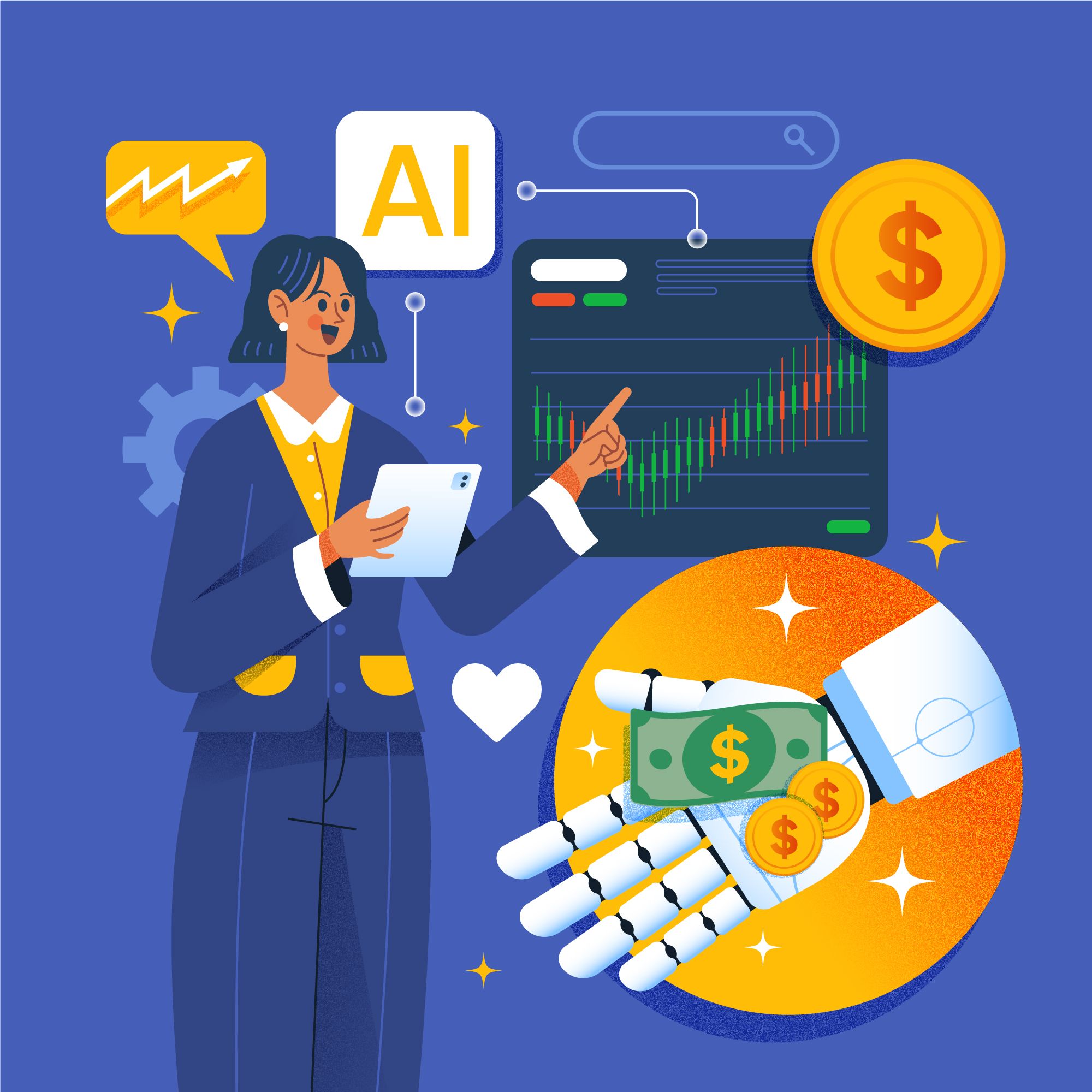AI tools
Mobile app development
Software development
Security practices
E-Commerce Solutions
Cross-platform development
Beyond the Screen: Revolutionizing Apps with AI, AR, and Blockchain
Iliya Timohin
2024-11-01
The rapid evolution of technology has reshaped the landscape of app development, moving beyond traditional screens to create interactive, intelligent, and secure user experiences. Emerging technologies such as Artificial Intelligence (AI), Augmented Reality (AR), Virtual Reality (VR), and Blockchain are pushing the boundaries of what apps can do. This article explores how these innovations are transforming app development, offering new possibilities in enhancing user experiences, revolutionizing gaming, education, and e-commerce, and improving data security.

How AI Can Enhance User Experiences
Artificial Intelligence has become a cornerstone in modern app development. It brings the power of machine learning, natural language processing, and data analytics to deliver highly personalized and efficient user experiences. Here are some key ways AI is enhancing apps:
- Chatbots and Virtual Assistants: AI-powered chatbots and virtual assistants are now widely used in customer service and support apps. These tools offer 24/7 assistance, handle frequently asked questions, and guide users through complex processes with conversational interfaces. For instance, AI chatbots integrated into e-commerce apps can help customers find products, answer questions about returns, and provide personalized shopping advice.
- Personalized Recommendations: AI algorithms analyze user behavior, preferences, and browsing history to recommend products, services, or content that match individual interests. This personalization is evident in platforms like Netflix, which uses AI to suggest shows and movies based on viewing habits, or e-commerce sites like Amazon, where product suggestions are tailored to previous purchases and browsing history.
- Predictive Text and Smart Typing: Applications like Grammarly or SwiftKey use AI to predict what users will type next and suggest relevant words or phrases. This feature not only speeds up typing but also improves accuracy, making apps smarter and more intuitive.
- Enhanced Image and Speech Recognition: AI's capabilities in image and speech recognition allow for apps that can recognize objects in pictures, translate speech in real-time, or even convert spoken language into text. This technology is used in voice-activated assistants like Siri or Alexa and visual search tools such as Google Lens.
The Potential of AR and VR in Gaming, Education, and E-Commerce
Augmented Reality (AR) and Virtual Reality (VR) have emerged as game-changers across multiple industries. Their ability to overlay digital information onto the real world (AR) or create immersive virtual environments (VR) opens up new possibilities for app development.
- Gaming: AR and VR have revolutionized the gaming industry by offering players an immersive experience that goes beyond traditional screen-based gameplay. Games like "Pokémon GO" have demonstrated the power of AR by encouraging players to explore the real world while hunting for virtual creatures. On the other hand, VR gaming platforms like Oculus Rift provide a fully immersive experience where players can step into virtual worlds, interact with 3D objects, and engage with the game environment as if they were truly there.
- Education: In education, AR and VR apps are being used to create interactive learning experiences. For example, medical students can use VR simulations to practice surgeries in a controlled, risk-free environment. AR can be used to bring textbooks to life by displaying 3D models or interactive diagrams when viewed through an AR app, making complex concepts easier to understand.
- E-Commerce: AR technology has become a valuable tool for online retailers, enabling customers to visualize products in their environment before making a purchase. Furniture companies like IKEA use AR to let users place 3D models of furniture in their rooms via a mobile app, allowing them to see how the products would fit and look. Similarly, beauty brands have embraced AR to create "virtual try-on" apps where customers can test how different makeup products would look on their faces before buying.
Blockchain's Role in Decentralized Apps and Secure Data Storage
Blockchain technology, known for its association with cryptocurrencies, is making a significant impact on app development by offering decentralized and secure solutions for data storage and transactions. Its main advantages lie in transparency, immutability, and security, making it suitable for various use cases.
- Decentralized Applications (dApps): Blockchain enables the creation of decentralized applications (dApps), which run on peer-to-peer networks rather than centralized servers. This eliminates the need for intermediaries, reducing costs and improving security. dApps are increasingly being adopted in areas such as finance (decentralized finance or DeFi), gaming, and social media, where they offer more control and ownership to users.
- Secure Data Storage: Blockchain's distributed ledger system ensures that data stored on the blockchain is encrypted and cannot be altered without consensus from the network. This makes it an ideal solution for storing sensitive data such as medical records, financial transactions, or intellectual property. For instance, blockchain-based healthcare apps can ensure that patient records are securely stored and only accessible to authorized individuals.
- Smart Contracts: Smart contracts are self-executing contracts where the terms are directly written into code. These contracts automatically execute actions once predefined conditions are met, eliminating the need for third-party enforcement. This feature is useful for applications that involve complex transactions, such as real estate platforms, supply chain management, or insurance claims.
Use Cases and Examples of Successful Implementations
Several companies have successfully integrated AI, AR, VR, and blockchain into their applications, demonstrating the transformative potential of these technologies.
- AI-Powered Healthcare Apps: Applications like Ada Health and Buoy Health use AI algorithms to assess symptoms and provide users with insights into potential health issues. These apps help users make informed decisions about seeking medical attention and provide initial guidance before seeing a doctor.
- AR in Retail: Sephora's "Virtual Artist" app allows users to try on different makeup products virtually using AR. This experience helps customers see how a product would look on their skin without physically applying it, making the shopping process more interactive and reducing the chances of returns.
- Blockchain-Based Social Media: Platforms like Steemit and Minds use blockchain technology to reward content creators with cryptocurrency for their contributions. These platforms offer a decentralized alternative to traditional social media, giving users more control over their data and content.
- VR in Real Estate: Companies such as Matterport use VR to create 3D models of properties, enabling potential buyers to take virtual tours from the comfort of their homes. This technology enhances the real estate buying experience by providing a realistic view of the property without requiring a physical visit.

The Future of Apps:
A New Paradigm
The integration of AI, AR, VR, and blockchain into app development signals a shift towards more intelligent, interactive, and secure applications. These technologies not only improve the functionality of apps but also create new opportunities for businesses to engage with users in meaningful ways. As emerging technologies continue to mature, we can expect to see even more innovative applications that blur the lines between the digital and physical worlds.
Whether you are looking to enhance your app with AI-driven personalization, create immersive AR or VR experiences, or secure data using blockchain, the possibilities are endless.
PintaWebware: Your Partner in App Development
For businesses looking to take advantage of these emerging technologies, PintaWebware offers custom app development services tailored to your needs. We specialize in creating intelligent, interactive, and secure applications that leverage AI and blockchain to transform your ideas into reality. Let us help you build the future of apps.